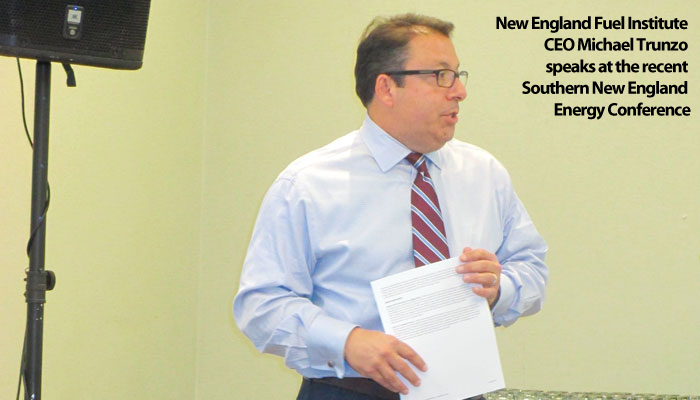New England Fuel Institute is trying to create opportunities for Oilheat marketers and alleviate challenges by taking on some of the difficult issues facing the industry.
During a presentation at the recent Southern New England Energy Conference, in Newport, R.I., NEFI President and CEO Michael C. Trunzo updated attendees on management of mid-winter backup fuel supplies at natural gas-fired power plants; regional requirements for biodiesel blending; and Low Income Home Energy Assistance Program (LIHEAP) reform.
Attendees also heard from NEFI Vice President Jim Collura, who discussed the prospects for realigning the U.S. Senate this month, and NEFI General Counsel Mark Morgan, who discussed some of the regulatory battles currently brewing in Washington.
Power Suppliers Must Prepare
Trunzo said that ISO-New England, the manager of the electric grid in New England, recently announced a “Winter Reliability Program” that requires power plant operators to have a 10-day supply of a secondary fuel physically on-hand or under contract. In the event that any of the reserve fuel goes unused, producers will be eligible for an $18/barrel payment for any heating oil that remains in their tanks or under contract. The program could cost ratepayers as much as $86 million.
Trunzo said he hopes the Winter Reliability Program will help prevent a disruptive run on distillate fuels this winter. When the Polar Vortex descended last winter and brought six continuous weeks of extreme cold, demand for heating oil for home heating and commercial heating customers increased. Meanwhile, natural gas supplies were overtaxed, which caused natural gas prices to reach record levels. For more than half the winter, natural gas spot prices exceeded heating oil spot prices, and power producers with dual-fuel capability switched from natural gas to distillate fuels, causing a run on distillates and a basis blowout.
Another priority for NEFI is promoting biodiesel blending requirements that will help heating oil improve its environmental profile. He said NEFI is in discussions with Northeast States for Coordinated Air Use Management (NESCAUM) about a regional Bioheat®fuel mandate for the NESCAUM region, which includes the six New England states plus New York and New Jersey. By evolving heating oil to an ultra low sulfur fuel blended with renewable biodiesel, the industry can gain an environmental advantage over natural gas that will support the development of favorable policy, according to Trunzo.
U.S. Senate Up for Grabs
NEFI is also keeping a close eye on the 2014 election, and NEFI VP Collura provided a detailed look at the battle for leadership of the U.S. Senate. Democrats now control the Senate with 53 Democratic members and two independents, but Republicans have an excellent chance to swing at least six seats and gain control, he said. One of the key swing races is taking place in New Hampshire, where Republican Scott Brown is trying to unseat Democratic incumbent Jeanne Shaheen, who was a principal supporter for reauthorization of the National Oilheat Research Alliance (NORA).
After the election, Congress will face important legislative decisions regarding the Biodiesel Blenders Tax Credit, home energy efficiency tax credits, drivers Hours of Service regulations, propane supply, and the Transportation Worker Identification Credential (TWIC) program.
The Congressional agenda will be heavily influenced by the election outcome, according to Collura. If the Democrats retain control of the Senate, the legislative stalemate that has stalled Congress in recent years is likely to continue, but if the GOP controls the Senate, Republicans are expected to push their agenda, including comprehensive tax reform; rolling back Dodd-Frank and Obamacare; approving the Keystone XL pipeline; and speeding the permit process for natural gas pipelines.
NEFI is also very active in the regulatory spheres, including enforcement activities by the U.S. Environmental Protection Agency (EPA) and the U.S. Department of Transportation (DOT). NEFI General Counsel Morgan said NEFI is intervening in several areas of regulatory activity, including LIHEAP reform, hazardous materials regulation, and Small Business Administration (SBA) categorization.
Morgan said DOT is considering raising the amount of financial responsibility that HazMat transporters must assume, which could lead to higher costs for energy marketers. New regulations would be aimed primarily at long-haul transporters, and Morgan said he is working to ensure that NEFI members do not get caught in the same net.
At the SBA, NEFI is working to help energy marketers retain small business categorization by focusing on the metric of employee count rather than on gross receipts. Rising energy costs have driven up gross receipts, and NEFI wants the SBA to categorize companies by the number of employees, to avoid having energy marketers lose access to SBA programs and being forced to pay government fees at large-business rates.





